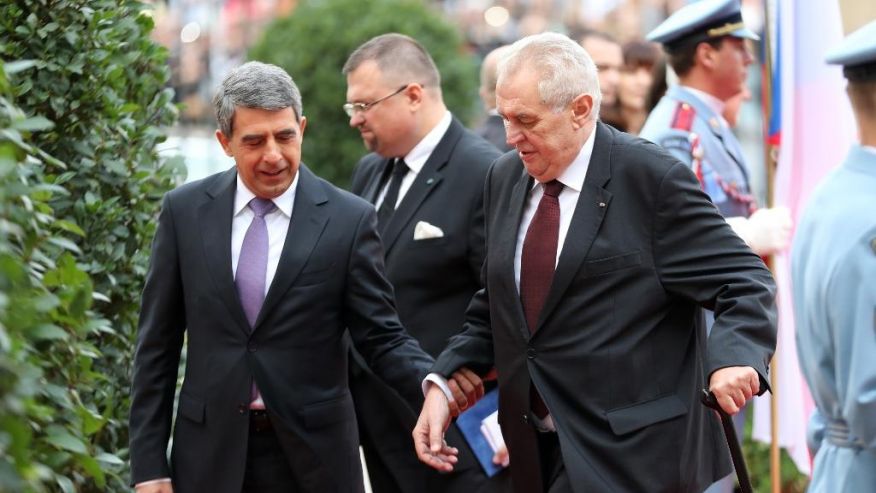İB Times, 06 September 2016
The Islamic State group has reportedly banned women from wearing a burka, a veil that covers the entire face, as a security precaution in the northern Iraqi city of Mosul. The alleged new rule is striking in part because the militant group also known as ISIS has beaten and killed women in the past for refusing to wear the conservative garment.
Militant leaders banned burqas after a group of veiled women carried out attacks against several ISIS commanders, according to media reports Tuesday. Women wearing burqas will no longer be allowed to enter buildings in Mosul, an ISIS stronghold, while wearing the full-body covering. Instead, they must wear gloves and gauze to cover their eyes. ISIS' morality police will continue to require women to wear the burqa outside of Mosul's new security rule, the Jerusalem Post reported.
ISIS has a poor record when it comes to women's rights, according to a recent Human Rights Watch report. The group is accused of raping and trading women and limiting women's freedom of movement, access to health care and education.
"Some women said they felt deeply humiliated by their treatment by ISIS, and two said they felt so depressed they had wanted to kill themselves," the report stated.
Conservative governments fearful of Islamic terrorism have banned burqas in recent years, drawing criticism from Muslim and progressive leaders who claim the laws oppose religious freedom and are anti-Islam. In 2015, Muslim women in the Chinese city of Urumqi in the western Xinjiang region were prohibited from wearing the burqa. Critics claim the rule was part of an effort to alienate the Uighurs, a sizable Muslim ethnic group in the region.
France banned garments that cover up people's face in public in 2011, including a burqa, niqab, which leaves a slot for a woman’s eyes, and masks. In Belguim, Brussels also outlawed full-face veils in 2011.
While burqas are mandatory in Iran and Saudi Arabia, some Muslim-majority nations have also debated banning face veils to protect national security. In Syria, officials banned veils from universities in 2010, while a proposed veil ban in Tunisia in 2015 prompted a national outcry, Quartz reported.
No comments yet.
-
 CZECH PRESIDENT: CZECHS TO GUARD BULGARIAN-TURKISH BORDER
The Balkans
07.09.2016
CZECH PRESIDENT: CZECHS TO GUARD BULGARIAN-TURKISH BORDER
The Balkans
07.09.2016
- IRAQ PUTS OUT MORE OIL FIRES AT NORTHERN FIELD, SOME STILL BURNING Iraq 07.09.2016
- CHINA & RUSSIA'S G20 MESSAGE: CONFRONTATION WITH WEST NOT OUR DESIRE Asia - Pacific 07.09.2016
- EU OMBUDSMAN QUESTIONS BARROSO'S BREXIT ROLE AT GOLDMAN SACHS Europe - EU 07.09.2016
- UZBEKISTAN SAYS KEEN TO DEVELOP STRATEGIC PARTNERSHIP WITH RUSSIA Asia - Pacific 07.09.2016
-
25.01.2016
THE ARMENIAN QUESTION - BASIC KNOWLEDGE AND DOCUMENTATION -
12.06.2024
THE TRUTH WILL OUT -
27.03.2023
RADİKAL ERMENİ UNSURLARCA GERÇEKLEŞTİRİLEN MEZALİMLER VE VANDALİZM -
17.03.2023
PATRIOTISM PERVERTED -
23.02.2023
MEN ARE LIKE THAT -
03.02.2023
BAKÜ-TİFLİS-CEYHAN BORU HATTININ YAŞANAN TARİHİ -
16.12.2022
INTERNATIONAL SCHOLARS ON THE EVENTS OF 1915 -
07.12.2022
FAKE PHOTOS AND THE ARMENIAN PROPAGANDA -
07.12.2022
ERMENİ PROPAGANDASI VE SAHTE RESİMLER -
01.01.2022
A Letter From Japan - Strategically Mum: The Silence of the Armenians -
01.01.2022
Japonya'dan Bir Mektup - Stratejik Suskunluk: Ermenilerin Sessizliği -
03.06.2020
Anastas Mikoyan: Confessions of an Armenian Bolshevik -
08.04.2020
Sovyet Sonrası Ukrayna’da Devlet, Toplum ve Siyaset - Değişen Dinamikler, Dönüşen Kimlikler -
12.06.2018
Ermeni Sorunuyla İlgili İngiliz Belgeleri (1912-1923) - British Documents on Armenian Question (1912-1923) -
02.12.2016
Turkish-Russian Academics: A Historical Study on the Caucasus -
01.07.2016
Gürcistan'daki Müslüman Topluluklar: Azınlık Hakları, Kimlik, Siyaset -
10.03.2016
Armenian Diaspora: Diaspora, State and the Imagination of the Republic of Armenia -
24.01.2016
ERMENİ SORUNU - TEMEL BİLGİ VE BELGELER (2. BASKI)
-
AVİM Conference Hall 24.01.2023
CONFERENCE TITLED “HUNGARY’S PERSPECTIVES ON THE TURKIC WORLD"









